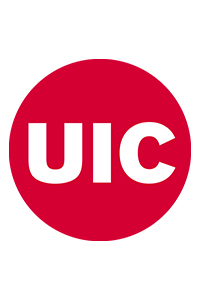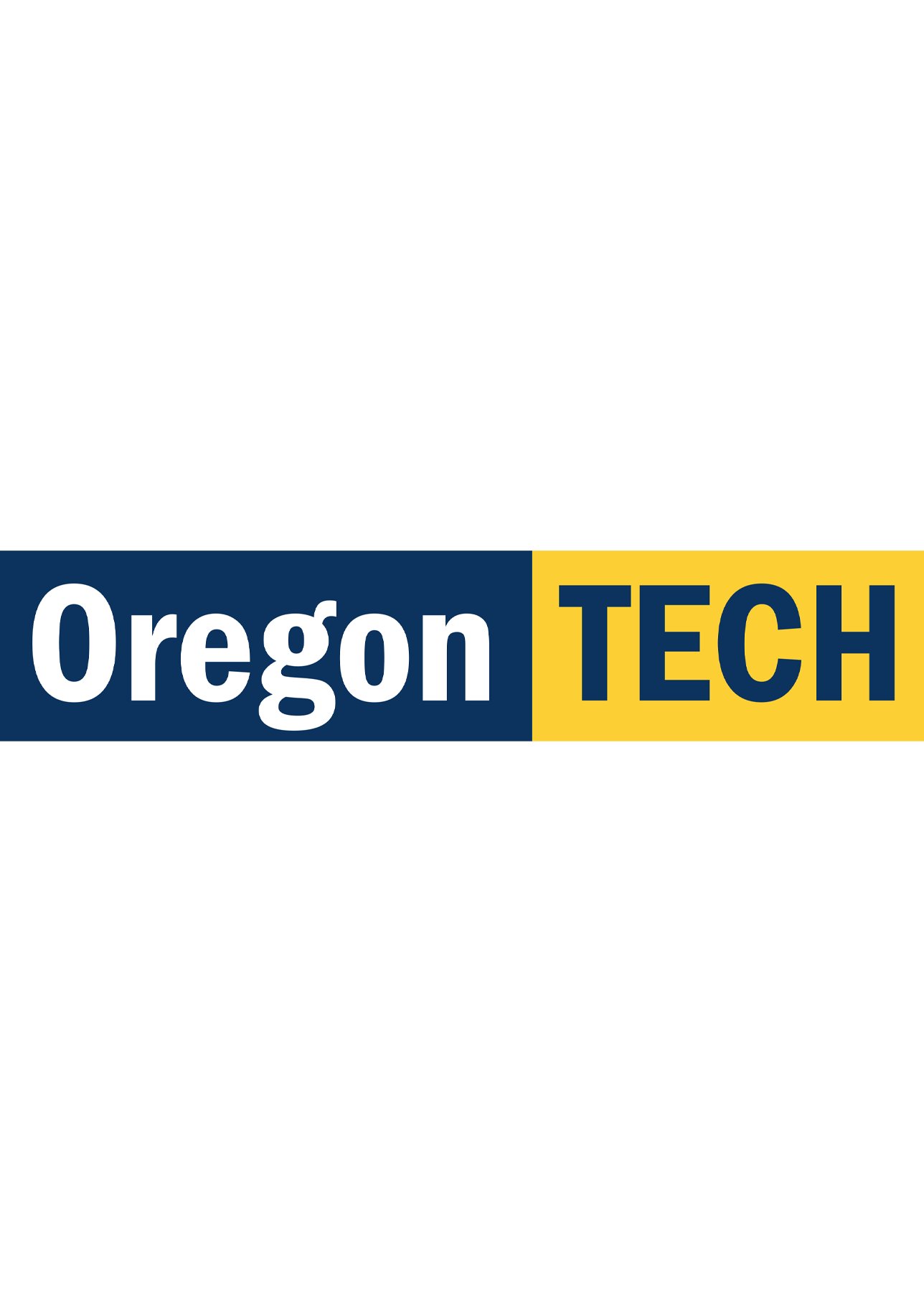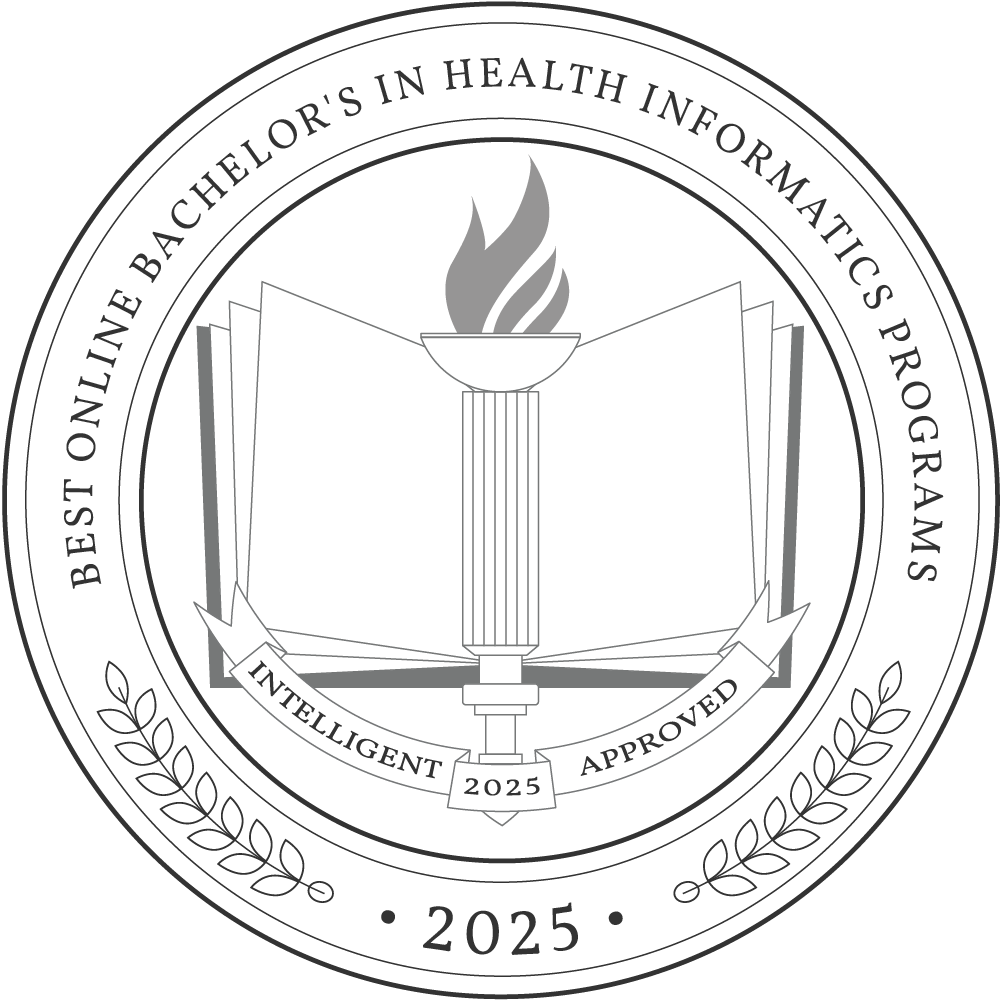Students passionate about health and technology can use an online bachelor’s in health informatics to become information specialists, working with hospitals, local organizations, or private companies. This degree involves collecting and analyzing health-related data to improve overall patient care. You might help diagnose and treat individual patients by gathering and analyzing data or address a health issue affecting an entire community.
A bachelor’s degree usually takes four years, but that timeline depends on how many credits you take each year. Most online bachelor’s in health informatics programs require about 120 to 130 credits. According to the National Center for Education Statistics, the average annual tuition for undergraduate programs is $7,998 at public schools and $34,923 at private schools.
Why Trust Us
The Intelligent.com Higher Education Team is dedicated to providing students with independent, equitable school and program rankings and well-researched resources. Our expert-driven articles cover topics related to online colleges and programs, paying for school, and career outlooks. We use data from the U.S. Department of Education’s College Scorecard, the National Center for Education Statistics, and other reputable educational and professional organizations. Our academic advisory team reviews content and verifies accuracy throughout the year for the most current information. Partnerships do not influence rankings or editorial decisions.
- Analyzed over 2,000 national, accredited, and nonprofit colleges and universities
- 800+ rankings pages are reviewed and updated yearly
- Content is informed by reputable sources, surveys, and interviews with academic advisors and other experts
- Over 100 data points are reviewed for accuracy and quality throughout the year, including sources
How we rank schools
Our list features the best online Health Informatics degree programs at top colleges nationwide. Each school featured is a nonprofit, accredited institution — either public or private — with a high standard of academic quality for post-secondary institutions.
We evaluated each school’s program on tuition costs, admission, retention and graduation rates, faculty, reputation, and the student resources provided for online students. We collected data from trusted sources like the National Center for Education Statistics, individual school and program websites, school admissions counselors, and other data sources. Then, we calculated the Intelligent Score on a scale of 0 to 100 based on the following criterion:
Academic Quality:
- Admission rate versus enrollment rate
- Retention rate of students who return after year one
- Accreditation status (regional and programmatic)
- Nonprofit status, both private and public institutions
Graduation Rate
- Overall graduation rate
- Total number of currently enrolled students, including diversity metrics
- Student-to-faculty ratio
Cost and ROI
- In-state and out-of-state per-credit tuition rates and fees
- Required credits to graduate
- Earning potential after graduation
- Availability of federal student loans, scholarships, and other financial aid options
Student Resources
- Available student services for online-only and hybrid programs
- On-campus amenities like tutoring centers and the number of libraries
Read more about our ranking methodology.
Best 27 Online Bachelor's in Health Informatics Programs
FiltersInstitution Type
Status
- Intelligent Score
- Alphabetically By University Name
- Acceptance Rate
- Enrollment
- In-state Graduate Tuition
- Out-of-state Graduate Tuition
- In-state Undergraduate Tuition
- Out-of-state Undergraduate Tuition

University of Central Florida
Intelligent Score: 99.09In-state: $4,478
Out-of-state: $19,810
In-state: $6,916
Out-of-state: $6,916
SAT: 1160-1340
ACT: 25-30
In-State: $179
Out-of-State: $716
Online
Commission on Accreditation for Health Informatics and Information Management Education
120

East Carolina University
Intelligent Score: 96.45In-state: $4,452
Out-of-state: $20,729
In-state: $4,749
Out-of-state: $4,749
SAT: 1020-1170
ACT: 19-24
Resident: $205
Non-Resident: $883
Online
Commission on Accreditation for Health Informatics and Information Management Education
120

University of Cincinnati
Intelligent Score: 96.39In-state: $9,723
Out-of-state: $25,057
In-state: $13,224
Out-of-state: $13,224
SAT: 1120-1330
ACT: 23-29
$366
Online
Commission on Accreditation for Health Informatics and Information Management Education
120

Western Kentucky University
Intelligent Score: 94.34In-state: $10,802
Out-of-state: $26,496
In-state: $12,140
Out-of-state: $12,140
SAT: 980-1180
ACT: 19-26
$551
Online
Commission on Accreditation for Health Informatics and Information Management Education
121-124

Louisiana Tech University
Intelligent Score: 94.15In-state: $6,401
Out-of-state: $13,143
In-state: $5,416
Out-of-state: $5,416
SAT: 1060-1270
ACT: 22-28
$400
Online, On-Campus
Commission on Accreditation for Health Informatics and Information Management Education
120

University of Illinois Chicago
Intelligent Score: 93.89In-state: $35,872
Out-of-state: $50,480
In-state: $39,068
Out-of-state: $39,068
SAT: 1080-1310
ACT: 23-31
$500
Online
Commission on Accreditation for Health Informatics and Information Management Education
123

Western Governors University
Intelligent Score: 90.99In-state: $6,380
Out-of-state: $6,380
In-state: $7,500
Out-of-state: $7,500
SAT: N/A
ACT: N/A
$268
Online
Commission on Accreditation for Health Informatics and Information Management Education
122

Indiana University Luddy Indianapolis
Intelligent Score: 90.17In-state: $9,815
Out-of-state: $36,194
In-state: $9,786
Out-of-state: $9,786
SAT: 1120-1350
ACT: 24-31
In-State: $317
Out-of-State: $412
Online, On-Campus, Hybrid
Commission on Accreditation for Health Informatics and Information Management Education
120

Davenport University
Intelligent Score: 90.02In-state: $19,320
Out-of-state: $19,320
In-state: $15,696
Out-of-state: $15,696
SAT: N/A
ACT: N/A
Resident: $974
Non-Resident: $658
Online
Commission on Accreditation for Health Informatics and Information Management Education
120

Ferris State University
Intelligent Score: 89.54In-state: $12,768
Out-of-state: $12,768
In-state: $7,908
Out-of-state: $7,908
SAT: 940-1160
ACT: 18-26
Resident: $483 - $526
Non-Resident: $800 - $850
Online, On-Campus
Commission on Accreditation for Health Informatics and Information Management Education
120

Texas Woman's University
Intelligent Score: 89.23In-state: $94
Out-of-state: $77
In-state: $48
Out-of-state: $48
SAT: Considered (not required)
ACT: Required
Resident: $238 - $268
Non-Resident: $648
Online, Hybrid
Southern Association of Colleges and Schools Commission on Colleges
120

Rutgers University - Newark
Intelligent Score: 86.69In-state: $12,230
Out-of-state: $29,012
In-state: $17,736
Out-of-state: $17,736
SAT: 1180-1410
ACT: 25-32
Resident: $500
Non-Resident: $600
Online
Commission on Accreditation for Health Informatics and Information Management Education
120

University of Toledo
Intelligent Score: 86.26In-state: $8,736
Out-of-state: $18,096
In-state: $14,398
Out-of-state: $14,398
SAT: 985-1210
ACT: 20-26
$335
Online
Commission on Accreditation for Health Informatics and Information Management Education
120

University of Southern Indiana
Intelligent Score: 86.08In-state: $8,716
Out-of-state: $20,252
In-state: $10,246
Out-of-state: $10,246
SAT: 980-1170
ACT: 19-25
Resident: $299
Non-Resident: $727
Online
Higher Learning Commission
120

Oregon Institute of Technology
Intelligent Score: 84.26In-state: $9,212
Out-of-state: $29,322
In-state: $12,713
Out-of-state: $12,713
SAT: 990-1200
ACT: 20-27
$308
Online, On-Campus
Northwest Commission on Colleges and Universities
120

Saint Joseph's College of Maine
Intelligent Score: 82.92In-state: $38,820
Out-of-state: $38,820
In-state: $9,482
Out-of-state: $9,482
SAT: 908-983
ACT: 20-24
$390
Online
Commission on Accreditation for Health Informatics and Information Management Education
120

Dakota State University
Intelligent Score: 80.93In-state: $7,541
Out-of-state: $10,611
In-state: $5,939
Out-of-state: $5,939
SAT: 1010-1190
ACT: 19-26
$355
Online, On-Campus
Commission on Accreditation for Health Informatics and Information Management Education
120

Peirce College
Intelligent Score: 80.14In-state: $25,034
Out-of-state: $25,034
In-state: NA
Out-of-state: NA
SAT: Not Required
ACT: Not Required
$600
Online
Commission on Accreditation for Health Informatics and Information Management Education
121
How to Choose an Online Bachelor’s in Health Informatics Degree Program
Choose your area of study
This degree is typically offered as a Bachelor of Science. A bachelor’s in health informatics program combines healthcare and technology, so students learn about health insurance, finance, managed care, data management, legal issues, medical terminology, pharmacology, and data analysis. A degree in health informatics often doesn’t involve a concentration. However, some schools allow for customizations through elective courses. If you already know exactly what kind of role you would like to have after you graduate, look for programs that closely match these career goals.
Research schools and programs
You should only apply to institutions that have been approved by a DOE-recognized regional accrediting organization, such as the New England Commission of Higher Education or Northwest Commission on Colleges and Universities. These organizations evaluate schools to ensure they provide students with a high-quality education. Those who attend a school that isn’t regionally accredited may be unable to access financial aid or transfer credits to another institution if needed.
Ideally, your online bachelor’s in health informatics program will also be accredited by a respected industry group like the Commission on Accreditation for Health Informatics and Information Management Education.
If you’re already employed, you’ll also want to determine whether any schools require lab work and in-person professional practice experiences, as these on-site activities might affect a full-time work schedule.
Additional questions students should ask when researching online bachelor’s in health informatics degrees include:
- What support services does the school offer online students?
- What networking opportunities are available to online students?
- Who are the faculty members, and what are their credentials?
To learn more about any schools that you’re interested in, you can visit the school’s website, contact an admissions counselor, follow the school on social media, or attend an in-person or virtual open house.
Prepare for tests and applications
Each program varies in its application requirements and process. However, most bachelor’s degree programs in health informatics require:
- High school diploma or GED
- Official high school transcript
- Scores from a standardized test such as the ACT or SAT
- A personal statement or letter of intent outlining your goals
- Letter(s) of recommendation from former teachers or employers
Depending on the program’s focus, there might be other prerequisites, such as a minimum GPA or particular math and social sciences classes.
Before starting your application, contact the school’s admissions office to confirm application requirements and deadlines.
Select your program
Some students apply to a single program tailored to their interests and needs, while others submit multiple applications to improve their odds of acceptance. Whatever you choose, most schools charge an application fee, which can add up if you apply to several schools. If you need financial assistance, contact the school to ask about a fee waiver.
Before making your final decision, review your needs and goals again. Do you plan to attend school full-time or part-time? Are you only interested in 100% online programs, or are you fine with a hybrid program that has a few in-person requirements? Some programs offer asynchronous courses, which can be completed at your own pace, while others only offer synchronous courses, which involve remotely attending lectures and completing assignments at the same time as other students — which of these two online learning formats do you prefer? Your school should accommodate your scheduling needs and learning preferences.
Determine how you’ll pay for your degree
During the research process, students should also gather information about a program’s cost and what types of financial aid they have available, including scholarships, grants, work-study, fellowships, and assistantships.
Another critical step is completing the Free Application for Federal Student Aid (FAFSA), which schools use to determine eligibility for federal student loans and need-based institutional aid.
Students already working can ask if their employer covers some costs through employer tuition assistance benefits, especially if their degree relates to their current job. Talk with your school’s financial aid office for more detailed information about how to pay for your degree.
What Can You Expect from an Online Bachelor’s in Health Informatics Degree Program?
Online bachelor’s in health informatics programs vary based on the school. Still, students can expect a core curriculum to focus on healthcare regulations, electronic medical records, and managing healthcare data securely.
Students will also likely have classes designed to build problem-solving and critical-thinking skills. Other courses may focus on executive leadership roles, overseeing a budget, evaluating information technology services, and developing a healthcare organization’s strategic plan.
In addition, some schools require in-person lab work, fieldwork, or an internship. This requirement will be a challenge for students who work full-time. You should speak to an admissions counselor at the school about fulfilling such requirements under your particular circumstances.
Potential courses you’ll take in an online bachelor’s in health informatics degree program
- Introduction to Health Informatics. Learn more about the role of technology in patient records, from the standard technology platforms the healthcare field uses to the regulations governing the storage of this data. Students will also learn more about the infrastructure and maintenance of healthcare information systems, including software, hardware, communications, and storage.
- Medical Terminology and Coding. A course of this type familiarizes students with medical terminology and how to translate that into codes for diagnoses and procedures. Expect to learn about various healthcare classification systems and ethical considerations around medical coding.
- Healthcare Information Flow. In this course, students learn management skills helpful in overseeing data for healthcare organizations. A course like this also covers healthcare data collection, data security, electronic health records, and computerized medical billing.
- Healthcare Reimbursement. A course like this explores reimbursement policies and financial practices throughout the healthcare industry. Expect to learn the role health informatics plays in improving reimbursements and the impact of reimbursements on the revenue cycle.
- Healthcare Delivery Systems. Students will learn about the function and organization of healthcare systems in the United States and other countries. They’ll also likely study the political, cultural, social, and economic forces influencing healthcare delivery, such as government funding.
- Cultural Competence and Population Health. In this course, students discuss population-based approaches to disease, managing care, and developing healthcare policy. Students will learn how medical practitioners apply health informatics data to real-world scenarios, such as developing programs to improve wellness among certain age groups.
What Can I Do With an Online Health Information Degree?
Driven by innovations in medical technology and an increased demand for healthcare and medical services, health information is a rapidly growing field. By developing technical, analytical, and research skills, graduates of health informatics degree programs have many options within the healthcare industry.
Some jobs are in medical or healthcare facilities, such as health services management. More technical roles, such as healthcare technologists and operations analysts, are employed by hospitals, private organizations, or the government. Graduates of health informatics programs can also use their qualifications to pursue more advanced roles or continued education.
Career outlook
- Medical and health services manager — Plan, coordinate, and oversee healthcare and medical facilities, departments, and other areas. Ensure the facility maintains regulatory compliance, strategize plans for improving efficiency and quality of services, and oversee administrative tasks.
- Median annual salary: $110,680
- Projected employment growth (through 2032): 28%
- New jobs projected: 54,700
- Health information technologist and medical registrar — Design and develop electronic healthcare systems to support medical organization and facility needs for patient data management. Organize and compile information in databases, analyze clinical data, and ensure privacy and confidentiality of patient information.
- Median annual salary: $62,990
- Projected employment growth (through 2032): 16%
- New jobs projected: 3,100
- Operations research analyst — Identify trends, opportunities, and issues for healthcare providers and medical facilities by analyzing and presenting data. Use data analysis and other tools to test models and recommend organizational strategies.
- Median annual salary: $83,640
- Projected employment growth (through 2032): 23%
- New jobs projected: 9,800
Online Bachelor’s in Health Informatics Degree Frequently Asked Questions
How do I apply to an online bachelor’s in health informatics degree program?
Check the application process for each school of your choice. Some schools have online portals to accept applications. Others use a streamlined admissions application system, such as the Common Application, which provides a central hub where students can apply to multiple schools. Be sure to have electronic versions (such as PDFs) of all the required information in the appropriate file size to upload. Talk with a school admissions counselor to verify you’ve gathered everything needed, such as relevant transcripts, test scores, an essay, and any letters of recommendation.
How much does an online bachelor’s in health informatics program cost?
The average tuition for an undergraduate degree is $7,998 at public universities and $34,923 at private institutions. However, several factors impact the ultimate cost of an online bachelor’s in health informatics.
Private schools are usually more expensive than public schools, though public schools typically charge out-of-state students a much higher tuition rate than in-state students. Also, students should expect to pay school fees for technology, library resources, and healthcare services.
How long does it take to earn an online bachelor’s in health informatics degree?
While this depends on the curriculum and the school, most schools say their online bachelor’s programs in health informatics take about four years to complete. Some schools offer accelerated options, which allow students to complete their required credits on a quicker timetable. A student’s enrollment status also impacts the program’s length; attending part-time instead of full-time could stretch that timeframe to six years or longer.
Is a health information degree worth it?
Having a bachelor’s degree is highly correlated with increased earning potential. For instance, the Bureau of Labor Statistics compiled data showing that those with a bachelor’s degree earn a weekly median salary of $1,493, compared to the weekly $889 for those without advanced education.
Health informatics careers also have significant growth projections over the next ten years. As such, graduates from these programs can benefit from high industry demand for skilled workers and competitive compensation options.

